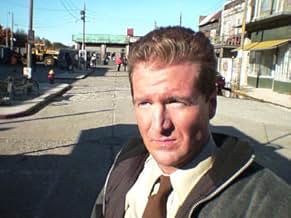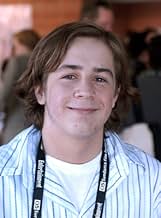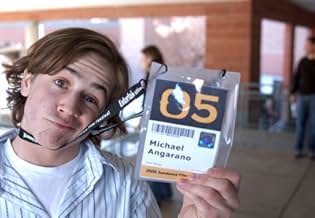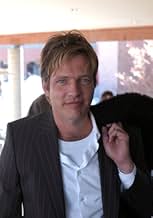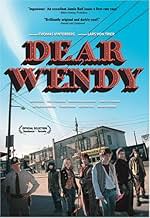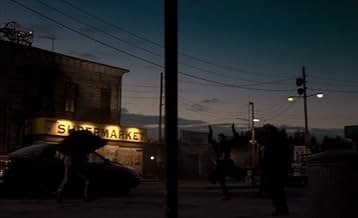NOTE IMDb
6,5/10
11 k
MA NOTE
Dans une ville américaine sans nom et intemporelle, un jeune garçon crée un gang de jeunes marginaux unis dans leur amour des armes et leur code d'honneur.Dans une ville américaine sans nom et intemporelle, un jeune garçon crée un gang de jeunes marginaux unis dans leur amour des armes et leur code d'honneur.Dans une ville américaine sans nom et intemporelle, un jeune garçon crée un gang de jeunes marginaux unis dans leur amour des armes et leur code d'honneur.
- Récompenses
- 1 victoire et 5 nominations au total
Avis à la une
I liked "Dear Wendy". It was well photographed, had good cast and the rocking soundtrack provided the light icing on a film that is both sad and happy from the inside.
It is a bit puzzling that this film has been seen as anti-American propaganda. It does criticise the American values - but so do many American films that are hardly described as anti-American. The message is even softened by placing the film in surreal, small mining town that is so detached geographically that you can almost feel the fiction. In some sense it bears resemblance to the village set on Brechtian stage in "Dogville" (compare for example the "stageness" of main street) by Lars von Trier, whose touch can be seen in "Dear Wendy", too.
It can be also seen as an anti-gun lecture - but that is just one perspective to it and in my opinion also possible to ignore.
The only turnoff is the somewhat annoying narration by the main character, that explains too much and leaves less for the viewer to ponder. I might be also giving one star too much, because the end scene, where the film picks up the pace left such a strong impression on me, and not just because of being so well shot action.
It is a bit puzzling that this film has been seen as anti-American propaganda. It does criticise the American values - but so do many American films that are hardly described as anti-American. The message is even softened by placing the film in surreal, small mining town that is so detached geographically that you can almost feel the fiction. In some sense it bears resemblance to the village set on Brechtian stage in "Dogville" (compare for example the "stageness" of main street) by Lars von Trier, whose touch can be seen in "Dear Wendy", too.
It can be also seen as an anti-gun lecture - but that is just one perspective to it and in my opinion also possible to ignore.
The only turnoff is the somewhat annoying narration by the main character, that explains too much and leaves less for the viewer to ponder. I might be also giving one star too much, because the end scene, where the film picks up the pace left such a strong impression on me, and not just because of being so well shot action.
"Dear Wendy" comes from the talents that brought us "Festen" and "It's All About Love" (both written and directed by Thomas Vinteberg), "Dogville," "Dancer in the Dark" and "Breaking the Waves" (written and directed by Lars Von Trier). They have collaborated on Dear Wendy, with Vinteberg at the helm and penned by Trier.
This is my favorite kind of movie; it begins with a "what if..." premise, which the storytellers follow with relentless commitment. In this case, the premise is "what if some misfit kids fell in love with their guns." Well, they'd give them names, they'd practice shooting and have a secret clubhouse, they'd study the famous gun-toting heroes of old, and the relationship they have with their weapons would become a mirror for their relationships with the world. All of which are pursued beautifully in the film.
Quite a few American movie critics read this film as a critique of American society, and they resent a European making a film about small-town America. An oft-vented complaint is that Trier has no business criticizing a country which he's never actually visited. I don't think, however, that this is ultimately a film about guns; the relationship these kids have with their guns is simply a unique window through which the filmmakers have chosen to show us the rich inner lives of the protagonists. They could have used a dysfunctional family (Festen), or movie musicals (Dancer In The Dark) or a tolling church bell (Breaking The Waves) to show us that world - but in this case it's guns.
Within the limits of the film medium - 10,000 words of dialog and around 140,000 frames of film - the choices of the filmmaker often revolve about what to leave OUT rather than what to put IN. This is a film that could be used as a textbook for economists. The script is tight - not a word out of place, although the narration feels conversational and casual. A film about child misfits and their guns could easily follow thematic red herrings all over the place in pursuit of social commentary, but "Dear Wendy" is utterly restrained - in spite of the "loaded" subject matter. On the cutting room floor are social commentary, cliché, and many of the cinematic crutches which Trier and Vinterberg rejected in their Dogme 95 days.
Any film lover who cares to see a film utterly committed to its premise, a film made with economy and efficiency, a film full of sweet irony, a film of deceptive simplicity, would do well to check out "Dear Wendy."
This is my favorite kind of movie; it begins with a "what if..." premise, which the storytellers follow with relentless commitment. In this case, the premise is "what if some misfit kids fell in love with their guns." Well, they'd give them names, they'd practice shooting and have a secret clubhouse, they'd study the famous gun-toting heroes of old, and the relationship they have with their weapons would become a mirror for their relationships with the world. All of which are pursued beautifully in the film.
Quite a few American movie critics read this film as a critique of American society, and they resent a European making a film about small-town America. An oft-vented complaint is that Trier has no business criticizing a country which he's never actually visited. I don't think, however, that this is ultimately a film about guns; the relationship these kids have with their guns is simply a unique window through which the filmmakers have chosen to show us the rich inner lives of the protagonists. They could have used a dysfunctional family (Festen), or movie musicals (Dancer In The Dark) or a tolling church bell (Breaking The Waves) to show us that world - but in this case it's guns.
Within the limits of the film medium - 10,000 words of dialog and around 140,000 frames of film - the choices of the filmmaker often revolve about what to leave OUT rather than what to put IN. This is a film that could be used as a textbook for economists. The script is tight - not a word out of place, although the narration feels conversational and casual. A film about child misfits and their guns could easily follow thematic red herrings all over the place in pursuit of social commentary, but "Dear Wendy" is utterly restrained - in spite of the "loaded" subject matter. On the cutting room floor are social commentary, cliché, and many of the cinematic crutches which Trier and Vinterberg rejected in their Dogme 95 days.
Any film lover who cares to see a film utterly committed to its premise, a film made with economy and efficiency, a film full of sweet irony, a film of deceptive simplicity, would do well to check out "Dear Wendy."
All of this recent fuss about David Cronenberg's film, "A History of Violence." What rot. You want a good film about violence and the gun culture in America? Check out this little gem from the co-founders of Denmark's Dogme 95 movement: Thomas Vinterberg ("The Celebration"), who directed this film, and Lars von Trier, who wrote the screenplay.
Von Trier drives many American film critics absolutely bonkers because he has the temerity to make films about the "American Character," even though he apparently has never set either of his personal feet on U.S. soil. First came "Dancer in the Dark," set in central Washington State, then "Dogville," set somewhere in the Colorado Rockies. (The actual locations were European, as is the case in Dear Wendy.) These earlier films may have had their problems, but they nonetheless stung with their unflattering depictions of American hypocrisy, greed, violence and injustice.
The worst thing you can say about von Trier's depictions is that they are derivative, hardly novel or unique. Think of Nathaniel Hawthorne, or Theodore Dreiser, or Ralph Ellison, or Don DeLillo , or David Foster Wallace, or any number of other authors. Pick from almost any generation of American writers and you'll find these same themes sounded. Because like it or not - they are valid. And it should come as no surprise that some intelligent foreigner who reads deeply about America might be capable of writing a credible screenplay about our national foibles.
"Dear Wendy" is set in an unnamed mining town sometime before the present day, probably the 1960s, judging from the musical soundtrack. The town is obviously a false set, not a natural location (odd since this violates of one of Dogme 95's central tenets, to always use natural locations). A miner's son, Dick Dandelion (Jamie Bell, who has carved out a niche, it seems, playing miner's sons, beginning with his splendid performance in Billy Elliot) is a misfit, too fragile and disinterested to spend his life down the mines. Out of sorts, aimless, Dick one day buys a toy gun as a gift for a buddy. But he learns from his fellow misfit friend Stevie (Mark Webber) that this gun is actually a small but real bullet shooting weapon. Stevie, as it happens, has an obsessive passion for guns, gun history and the workings of guns.
These two hit upon a plan: why not start a little club, a cult of losers and outcast young people, the town's stray kids, and bring a little honor, pride and some decent principles of conduct into their lives. No one else is going to give them a break, so it's self-help time. The club will have a secret headquarters for meetings, indoctrination and just hanging out. The unifying themes will be the possession and adulation of firearms juxtaposed with pacifism (is this an amusingly ironic riff on our culture or what ?!) Members will learn to love their guns, to name them, to vivify imagined relationships to their guns. But they will also be honor bound never to use them to commit violent acts against others, not to mention each other.
The group is named The Dandies, presumably after Dick's surname, and grows to include Susan (Alison Pill), Huey (Chris Owen), Freddie (Michael Angarano), and Sebastian (Danso Gordon). An aging black woman, Clarabelle (Novella Nelson), eventually becomes a sort of honorary member, or, more precisely, someone whom The Dandies find need to protect from harm, once the going gets rough.
And the going does get rough. We know that it will only be a matter of time before the idyllic fantasy life shared by this noble little band is somehow shattered by violence. This force arrives in the form of Sheriff Krugsby (Bill Pullman) and a legion of police sharpshooters. It's the gunfight at the Not Very OK Corral. Without getting into further particulars, I will say that the final shootout between The Dandies and Pullman's legion is conducted with an awesome display of police firepower that absolutely resembles the massive use of high tech weaponry that we are accustomed to witnessing when America goes to war, whether abroad or in quelling domestic uprisings (think of Fallujah and Waco).
All the actors I have named deliver good turns. I was especially impressed by Bill Pullman, Jamie Bell and Mark Webber. The sound track features several songs by the 60s British pop/rock band, The Zombies, including their great hits, "She's Not There" and "Time of the Season." More than anything, to me this film feels a lot like a couple of Gus Van Sant's movies. The Dandies adopt period costumes as well as arcane, stylized manners like the street people in "My Own Private Idaho," and the notion of outcast young people bearing weapons, of course, permeates "Elephant," in a similarly lyrical manner.
I think "Dear Wendy" is a powerful film, brimming with poetic truth about us. Yes, it is polemical, one sided, provocative. It may be only half the truth, ignoring our national virtues. And the slant may be familiar. But Vinterberg and von Trier have teamed up to make a decent movie about our seemier side. (In English). My rating: 8/10 (B+). (Seen on 12/11/05). If you'd like to read more of my reviews, send me a message for directions to my websites.
Von Trier drives many American film critics absolutely bonkers because he has the temerity to make films about the "American Character," even though he apparently has never set either of his personal feet on U.S. soil. First came "Dancer in the Dark," set in central Washington State, then "Dogville," set somewhere in the Colorado Rockies. (The actual locations were European, as is the case in Dear Wendy.) These earlier films may have had their problems, but they nonetheless stung with their unflattering depictions of American hypocrisy, greed, violence and injustice.
The worst thing you can say about von Trier's depictions is that they are derivative, hardly novel or unique. Think of Nathaniel Hawthorne, or Theodore Dreiser, or Ralph Ellison, or Don DeLillo , or David Foster Wallace, or any number of other authors. Pick from almost any generation of American writers and you'll find these same themes sounded. Because like it or not - they are valid. And it should come as no surprise that some intelligent foreigner who reads deeply about America might be capable of writing a credible screenplay about our national foibles.
"Dear Wendy" is set in an unnamed mining town sometime before the present day, probably the 1960s, judging from the musical soundtrack. The town is obviously a false set, not a natural location (odd since this violates of one of Dogme 95's central tenets, to always use natural locations). A miner's son, Dick Dandelion (Jamie Bell, who has carved out a niche, it seems, playing miner's sons, beginning with his splendid performance in Billy Elliot) is a misfit, too fragile and disinterested to spend his life down the mines. Out of sorts, aimless, Dick one day buys a toy gun as a gift for a buddy. But he learns from his fellow misfit friend Stevie (Mark Webber) that this gun is actually a small but real bullet shooting weapon. Stevie, as it happens, has an obsessive passion for guns, gun history and the workings of guns.
These two hit upon a plan: why not start a little club, a cult of losers and outcast young people, the town's stray kids, and bring a little honor, pride and some decent principles of conduct into their lives. No one else is going to give them a break, so it's self-help time. The club will have a secret headquarters for meetings, indoctrination and just hanging out. The unifying themes will be the possession and adulation of firearms juxtaposed with pacifism (is this an amusingly ironic riff on our culture or what ?!) Members will learn to love their guns, to name them, to vivify imagined relationships to their guns. But they will also be honor bound never to use them to commit violent acts against others, not to mention each other.
The group is named The Dandies, presumably after Dick's surname, and grows to include Susan (Alison Pill), Huey (Chris Owen), Freddie (Michael Angarano), and Sebastian (Danso Gordon). An aging black woman, Clarabelle (Novella Nelson), eventually becomes a sort of honorary member, or, more precisely, someone whom The Dandies find need to protect from harm, once the going gets rough.
And the going does get rough. We know that it will only be a matter of time before the idyllic fantasy life shared by this noble little band is somehow shattered by violence. This force arrives in the form of Sheriff Krugsby (Bill Pullman) and a legion of police sharpshooters. It's the gunfight at the Not Very OK Corral. Without getting into further particulars, I will say that the final shootout between The Dandies and Pullman's legion is conducted with an awesome display of police firepower that absolutely resembles the massive use of high tech weaponry that we are accustomed to witnessing when America goes to war, whether abroad or in quelling domestic uprisings (think of Fallujah and Waco).
All the actors I have named deliver good turns. I was especially impressed by Bill Pullman, Jamie Bell and Mark Webber. The sound track features several songs by the 60s British pop/rock band, The Zombies, including their great hits, "She's Not There" and "Time of the Season." More than anything, to me this film feels a lot like a couple of Gus Van Sant's movies. The Dandies adopt period costumes as well as arcane, stylized manners like the street people in "My Own Private Idaho," and the notion of outcast young people bearing weapons, of course, permeates "Elephant," in a similarly lyrical manner.
I think "Dear Wendy" is a powerful film, brimming with poetic truth about us. Yes, it is polemical, one sided, provocative. It may be only half the truth, ignoring our national virtues. And the slant may be familiar. But Vinterberg and von Trier have teamed up to make a decent movie about our seemier side. (In English). My rating: 8/10 (B+). (Seen on 12/11/05). If you'd like to read more of my reviews, send me a message for directions to my websites.
I went into this film extremely hesitant. I don't know Vinterberg well, but I do know there isn't much about Lars that I like at all. Top that with a subject matter that I'm rather sensitive about as well. But the film was beautifully filmed and the performances were enjoyable. I enjoyed all of it. I disagree with critics who say the film attacked America or had a heavy-hitting message in it. I think it's subtler than that. For me it was the big surprise of Sundance 05. Rich and fun. In the script, the characters were twice as old as those in the film, and I think Vinterberg made a wise choice in changing that. What is powerful in a teenager can look dorky in a 30-something.
While the cinematography was very pleasing to the eyes and the young actors did a commendable job, the story itself leaves something to be desired. Though it starts out with an interesting concept, Dear Wendy winds its way into a ridiculous hole. The "twists" are random and unfounded, probably there for the sole reason of providing conflict. Also, the movie tends to be sluggish: watching for an hour feels like two or three. On the positive side, the young actors did a very good job (for the most part). At times dramatic pauses cause more laughter than thought, but that's difficult to avoid with the script. Eye-catching camera angles were used, along with some interesting techniques. To sum up, the director, cinematographer, and actors are probably usually amazing at their jobs; however, if they enjoy their careers they should stay away from writing like this.
Le saviez-vous
- AnecdotesIn Lars von Trier's script, the main characters were in their 20s. Director Thomas Vinterberg decided to change it, so they became children instead. Lars von Trier later stated that he thought the age change was a brilliant idea.
- GaffesThe plan of Electric Square labels "CENTRE POLE" using the British rather than the American spelling. The film was shot in Denmark and Germany rather than in West Virginia, USA.
- ConnexionsFeatured in Letters to Dear Wendy (2005)
- Bandes originalesShe's Not There
Written and Performed by The Zombies
Zombies Heaven, "Begin Here & Singles" (c)
Courtesy of Marquis Enterprises
Meilleurs choix
Connectez-vous pour évaluer et suivre la liste de favoris afin de recevoir des recommandations personnalisées
- How long is Dear Wendy?Alimenté par Alexa
Détails
- Date de sortie
- Pays d’origine
- Sites officiels
- Langue
- Aussi connu sous le nom de
- Calles peligrosas
- Lieux de tournage
- Sociétés de production
- Voir plus de crédits d'entreprise sur IMDbPro
Box-office
- Budget
- 50 000 000 DKK (estimé)
- Montant brut aux États-Unis et au Canada
- 23 106 $US
- Week-end de sortie aux États-Unis et au Canada
- 8 222 $US
- 25 sept. 2005
- Montant brut mondial
- 607 229 $US
- Durée1 heure 45 minutes
- Couleur
- Mixage
- Rapport de forme
- 1.66 : 1
Contribuer à cette page
Suggérer une modification ou ajouter du contenu manquant

Lacune principale
By what name was Dear Wendy (2005) officially released in Canada in English?
Répondre

